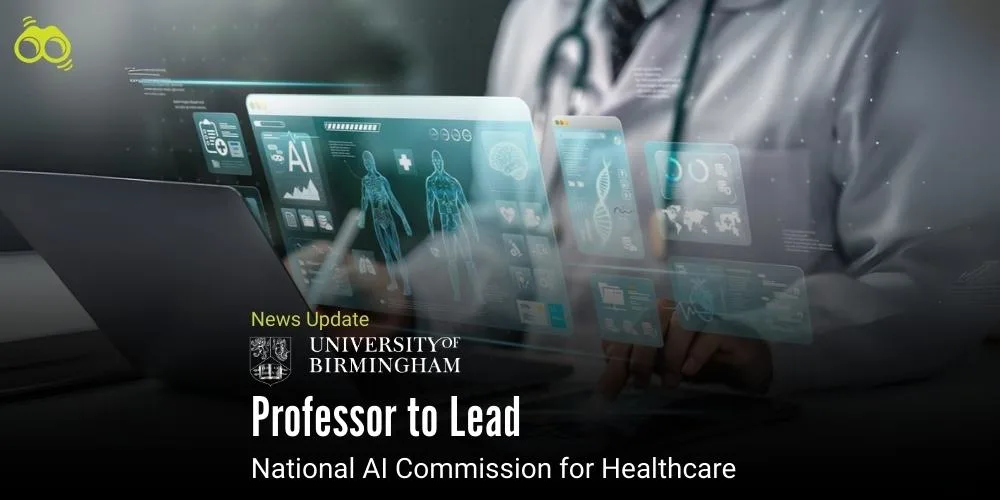UK Launches AI Healthcare Commission with Birmingham Leadership
Professor Alastair Denniston Appointed Chair of National AI Regulation Body
Professor Alastair Denniston of the University of Birmingham has been named Chair of the newly established UK National Commission on the Regulation of AI in Healthcare. The Commission will be a major influence on the safe and effective use of artificial intelligence throughout the NHS. Its overall goal is to develop a trusted regulatory model that facilitates healthcare innovation with AI while ensuring patient safety. This advance continues to demonstrate the increasing relevance of AI in the UK healthcare industry and further cements the University of Birmingham as a prime example of medical school AI research.
The Commission will consist of professionals from international technology firms, clinicians, researchers, and patient representatives. They will collectively consult the Medicines and Healthcare products Regulatory Agency (MHRA) on the revision of the guidelines on artificial intelligence in clinical and medical universities.
They will publish the new guidelines next year. The committee will also start examining AI tools that have been pending due to ambiguous rules, such as virtual clinicians' assistants and remote monitoring systems. These systems can minimise paperwork and enhance patient care, so they are critical to the future of healthcare science and technology.
Professor Denniston, who directs a number of national research programmes in AI and digital health, called the Commission an important step forward. He called for public confidence and professional trust in AI systems, commenting that responsible innovation has to be at the centre of any regulatory transition. His appointment has been welcomed by senior colleagues at the University of Birmingham, who welcomed his leadership and the university's increasing reputation for artificial intelligence in the UK. As part of the government's broader Plan for Change, this initiative will be expected to bring in investment, accelerate access to new technologies, and underpin global leadership in AI. The UK national AI health commission is a turning point in the approach of the nation towards AI and science in healthcare,collating expertise, regulation, and innovation to enhance lives and make the NHS more robust.
Editor's Note
Professor Alastair Denniston's appointment as Chair of the UK National Commission on the Regulation of AI in Healthcare is no individual achievement; it's a national indicator. In an era where artificial intelligence is transforming clinical practice, diagnostics, and patient care at lightning speed, the UK has opted to be first with caution, clarity, and credibility. This is a relief from hype to regulation. Denniston's leadership, which is based on profound regulatory and academic expertise, provides the Commission with authority and direction. His role at the University of Birmingham, already an established centre for AI and science in healthcare, is evidence that medical school AI research is no longer a specialist interest but a central bastion of contemporary health systems. The reality that this Commission will be counselling the redrafting of the rulebook for AI within the NHS is ambitious and long overdue. Artificial intelligence in medical universities cannot simply be a technical development; it has to be ethical, inclusive, and transparent. The UK national AI healthcare commission has the opportunity to make global standards, draw in responsible investment, and ensure that healthcare innovation using AI is patient-focused. Getting it right here could be the blueprint that is trusted by the public and sets the UK out as a genuine global leader in AI.
Skoobuzz highlights that the UK's decision to place regulatory science at the heart of AI in healthcare signals a mature and measured approach to innovation.
FAQs
1. Who is leading the UK national AI healthcare commission?
Professor Alastair Denniston from the University of Birmingham is leading the UK National Commission on the Regulation of AI in Healthcare. He brings strong experience in both medical research and regulation, helping guide how AI is safely used in the NHS.
2. How is the University of Birmingham advancing?
AI in healthcare. The University of Birmingham is a key centre for AI and science in healthcare. It runs several research programmes focused on digital health, data tools, and safe use of AI in hospitals. The university also trains future experts and works closely with national health bodies.
3. What role does AI play in the future of medicine?
AI is expected to help doctors diagnose illnesses faster, manage patient care more efficiently, and reduce paperwork. It can also support remote monitoring, improve treatment plans, and make healthcare more personalised. In short, AI will help medicine become smarter and more responsive.
4. Which UK universities research artificial intelligence in healthcare?
Several UK universities are active in this field, including the University of Birmingham, University of Oxford, Imperial College London, and University College London. These institutions focus on medical school AI research, combining science and technology to improve patient care.
5. Why is AI important for healthcare innovation?
AI helps bring new ideas into healthcare by making systems quicker, safer, and more accurate. It supports doctors, improves patient outcomes, and allows hospitals to use resources better. With the right rules and support, AI can lead to big improvements in how healthcare works.
6. How will the AI Commission help the NHS?
The Commission will give clear guidance on how AI tools can be safely used in hospitals and clinics. This means doctors and nurses can access new technologies more quickly, helping them save time, improve care, and treat patients more effectively.
7. What kind of AI tools are being reviewed by the Commission?
The Commission is looking at AI tools that support clinical work, such as virtual assistants for doctors, systems used in radiology and pathology, and remote monitoring devices that allow patients to be cared for from home. These tools have been delayed due to unclear rules, and the Commission aims to fix that.














0 Comments (Please Login To Continue)